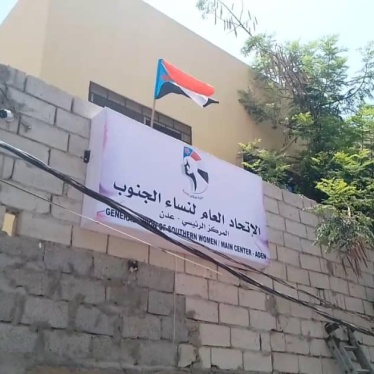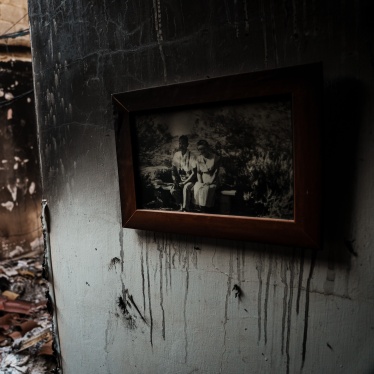Distinguished Committee members:
We write concerning the CEDAW Committee’s general discussion on rural women, and the elaboration of a General Recommendation on this issue.
The Committee’s concept note for the General Recommendation provides an excellent analysis of how rural women’s rights are insufficiently addressed in laws, policies, and government and donor agencies’ investment strategies. Human Rights Watch has documented abuses of the rights of rural women and girls in many countries around the world, with findings very much in line with the analysis in the concept note. We are certain that elaboration of a General Recommendation on rural women reflecting this analysis will make a profound contribution to promoting rural women’s rights.
This submission (1) highlights some examples of Human Rights Watch reports from the past several years that illustrate the problems identified in the Committee’s concept note, and (2) points to several topics where further analysis through the General Recommendation would be helpful.
Examples of Recent Human Rights Watch Work on Rural Women and Girls
Our work in all regions of the world has illustrated the particular human rights problems faced by rural women and girls. This overview describes some recent examples of our work in this area, and many more examples are available on the Human Rights Watch website.
In terms of economic rights, Human Rights Watch has documented the vulnerability of rural women in the context of flawed resettlements for international mining projects in Mozambique, which undermined women farmers’ rights to food, water, and work. Many of our reports on domestic workers, including reports on Morocco, Cambodia, Malaysia, Jordan, Sri Lanka, and Indonesia, show that women and girls who leave rural areas in search of decent work as domestic workers often face a range of abuses, in part due to problematic labor and immigration laws. Our work on women’s property rights and family laws examines how rural women face discrimination and other hardships due to insecure rights to land and other marital property. In Bangladesh, for example, we documented how a flawed land distribution policy disadvantaged rural women in the context of a discriminatory framework of personal status laws. In Tanzania, we found that girls working at rural artisanal gold mining sites faced sexual harassment and commercial sexual exploitation.
Many of our projects have focused on rural women’s and girls’ right to health, with findings reflecting the concerns highlighted in the Committee’s concept note. For example, our reports on South Africa, Kenya, South Sudan, Yemen, Afghanistan, and India documented the barriers that rural women and girls face in accessing reproductive and maternal health care. This puts them at risk of childbirth injuries, such as obstetric fistula, and maternal death. In northern Uganda, we investigated the greater barriers to accessing reproductive and sexual health care for women with disabilities living in rural areas, such as long distances to clinics and discrimination by health workers. In Ireland, we found that rural women faced extreme difficulties in accessing information about safe abortion options in other countries.
Violence against rural women and girls has been the focus of several Human Rights Watch reports in recent years, and we are encouraged to see the emphasis on this in the concept note. We have documented, for example, police abuse of indigenous and rural women and girls in northern British Columbia, Canada; sexual and domestic violence against displaced women and girls in Colombia, many of whom suffered abuse in their original rural villages and continued to face violence when displaced to larger cities; female genital mutilation prevalent in rural towns in Iraqi Kurdistan; poor enforcement of orders for protection for domestic violence survivors—including in rural areas—in Turkey; violence against women with disabilities in northern Uganda; and vulnerability to domestic violence among girls subjected to child and forced marriage in South Sudan, Afghanistan, and Yemen, and the social pressure in rural areas to marry young.
We share the Committee’s concern about rural women’s participation in public life, and have focused on barriers to political participation in several countries. Our work on Afghanistan, including in rural areas, shows a constant threat to the security of women exercising their right to participate in public life, sometimes resulting in assassinations. In Libya, we documented barriers to political participation in the 2012 elections, including the barriers that rural women faced in the registration and voting process.
Cutting across all of these topics, we have found that access to government services and remedies is often difficult for rural women and girls, including access to judicial remedies or other accountability mechanisms, social assistance, education, health care, shelters, and other services.
Topics for Further Elaboration
The Committee’s concept note already includes an impressive scope of analysis, and we hope the General Recommendation will cover the bulk of the issues addressed in the concept note. As the Committee continues work on the General Recommendation, we recommend that you further deepen or expand the analysis on several points:
• The concept note mentions the role of discriminatory family laws as a factor in limiting women’s autonomy to seek decent employment (in the chart on proposals for government action, with the subsection on decent rural employment). Given that discriminatory family laws on divorce, marital property, and inheritance are key drivers of poverty and inequality among rural women and girls, we encourage the Committee to expand the focus on family laws. It would be helpful if the General Recommendation would reinforce the need for laws guaranteeing rights to an equal share of marital property upon divorce, to equal inheritance rights, and to maintenance or alimony. The Committee should also emphasize the need for non-discrimination in land distribution policies.
• The role of traditional and religious authorities in undermining rural women’s rights should be noted in the General Recommendation, including their role in perpetuating harmful practices such as “widow inheritance” or “wife inheritance” (whereby a widow is “inherited” by a male in-law in what often amounts to forced marriage), baad (trading young girls to “settle” inter-family disputes), and child marriage, and in committing or inciting violence against women and girls—for example, through ordering “honor” crimes or attacks on women they consider “witches.”
• The concept note identifies access to social security as a concern (in the chart on proposals for government action), and mentions the need for government efforts to ensure that rural women receive identity cards. We hope the General Recommendation can go further by urging governments to develop social security and assistance programs tailored to address the particular needs and vulnerability of rural women and girls. We also hope the General Recommendation will underscore the need to include women working in the informal sector—as many rural women do—in social security programs.
• It would also be helpful if the General Recommendation had an inclusive definition of “rural” women, taking into account the reality of seasonal migration for work and restrictions on migrants obtaining registration documents when they have left rural communities.
We congratulate you again on the progress made toward a strong General Recommendation on rural women, and hope this letter and links to our materials are helpful for your work on this matter. We would be happy to discuss issues relevant to the General Recommendation or to answer any questions you might have about our work in this area.
Sincerely,
Gauri van Gulik
Global Advocate, Women's Rights Division







